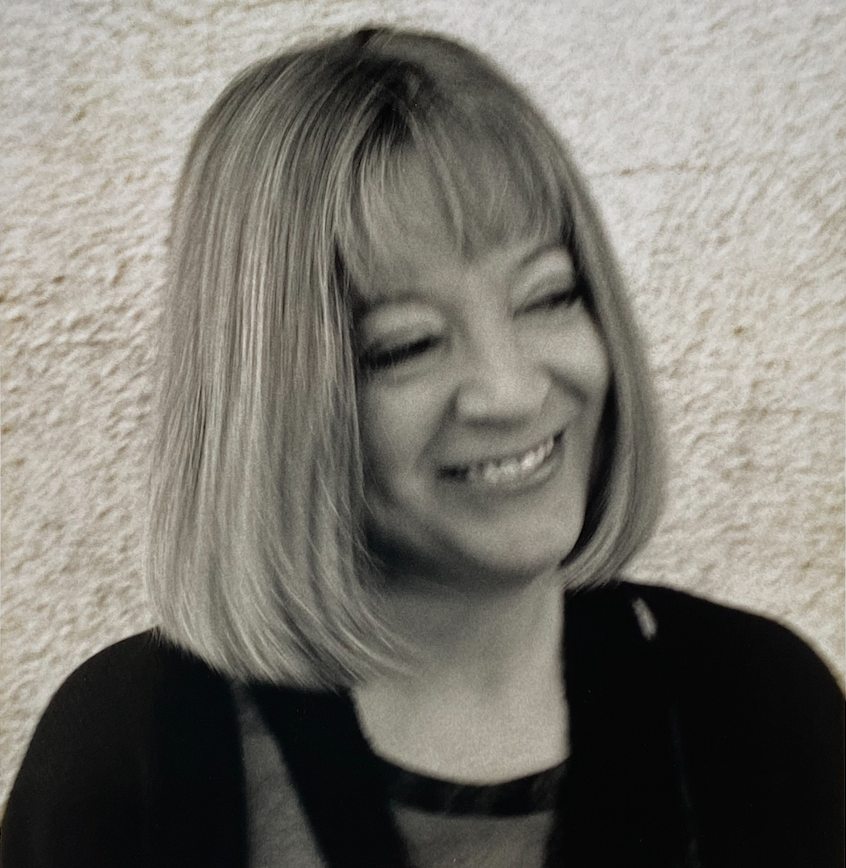

I have been lucky to locate compassionate, smart therapists who, unlike many of my medical doctors, are good listeners without complicating preconceptions that get in the way of real help. I’ve read that Cognitive Behavior Therapy is most successful with ME/CFS patients, but I’ve found that personality and a willingness to be eclectic matters more than strict professional orientation or ideology.
Barbara Cole-Kiernan, MSW, Highland Park, New Jersey
I’d tried to meditate with her help, but, as usual, couldn’t focus on anything besides my virulent fear, which, we all know, can harm your recovery and make chopped liver of your immune system.
I loved Dr. Karp (remember him? My Reichian therapist?) but just didn’t have the strength to keep driving an hour each way to Lawrenceville, N.J. I don’t remember who referred me to Barbara, but there she was, a hippie in her 50’s with long hair, long skirts and long flowing blouses, up on the second floor of an office building in Highland Park.
She’d been on all kinds of meditation retreats, even ones with days of silence. She knew all the meditation gurus and tapes, but surprisingly, there was nothing spacey about Barbara. She had a clear, organized mind. Though she encouraged meditation and relaxation practices, she listened to me carefully and understood quickly that I needed immediate practical intervention rather than long-term psychotherapy.

A yoga nidra CD containing voice guided progressive relaxation and music worked for Carol where other meditative techniques had failed.
She believed in my illness and did her best to help me cope. And she had a definite no-nonsense thing; I couldn’t get away with my articulate excuses or rationalizations. “Why are you saying that? Isn’t that bullshit? You’re smarter than that.” Maybe that sounds harsh, but I liked it. She pushed me in a practical way to focus on the “now” of my life, rather than what was or will be.
Okay, once in a while she tried out some new-age hippy-dippy technique, but only with her tongue in her cheek. It’s hard to explain. She believed and didn’t believe, experimenting maybe for an emotional/physical rather than mystical effect. Whatever. It was kinda fun.
She’d disclaim any proven scientific validity, but state, “Well, it can’t hurt. Who knows? Some people have found this useful. Whaddya say?” Maybe there were vials involved, and some slight massages a la the previous nuts. I don’t know if it helped, but she was right; it didn’t hurt.
Barbara did, however, introduce me to something that has continued to help me over the years: A practice called “Yoga Nidra.” She handed me a CD that amazingly cut through the ever present panic buzzing in my head and in my gut. I’d tried to meditate with her help, but, as usual, couldn’t focus on anything besides my virulent fear, which, we all know, can harm your recovery and make chopped liver of your immune system.
I began to lie in my bed after lunch and listen to “Yoga Nidra: Dreams of Ancient Yogis”; following the voice’s instructions on the tape brought me to a point where I would either fall asleep or mellow out into a sweet rest. I’d heard about and even (unsuccessfully) tried progressive relaxation before, but somehow now the combination of attending to various parts of the body and visualization accompanied by new age-y music and Barbara’s encouragement and support worked.
- Dig Deeper: Find out more about yoga nidra on our yoga nidra ME/CFS/FM page.
I felt Barbara was helping. Then, one bright day, she revealed that she was moving her Highland Park practice to Lambertville, New Jersey, where she lived. Sure, I could see her there. It was only 39.8 miles, 57 minutes away.
So I said goodbye Barbara Cole-Kiernan, as I had said goodbye, Gary Karpf.
M Best and Last Therapist, Dr. Robert Fink, PhD, Highland Park, New Jersey
I had issues up the wazoo
I’d been seeing Bob Fink for three years when my friend Rona called to ask me if I’d heard the news. Bob had suffered a heart attack and died. Sixty-two years old.
Another sudden deprivation. . .and heartbreak.
After a hiatus from therapy of about six months following Barbara, I was doing all right with illness issues, but then along came the family crisis I’d been expecting all my life when my neurotic, narcissistic 92 year old mother fell out of bed and broke her pelvis. (This was not the first time she actually called me from the floor.)
She wound up in the hospital and then rehab, while my 89 year old father with serious Alzheimers Disease stayed at home with a 24 hour nurse’s aide, and my 60 year old mentally handicapped brother who lived alone in a tiny shabby apartment near my mother’s office freaked out.
I had issues up the wazoo.
I’d known about Bob Fink since he treated each of my sons for a very short time when they were teenagers, around 25 years before. Jack had been caught drunk at the radio station at high school and a community council made him see a therapist. Todd went of his own volition because he was a rebellious teenager who hated the restrictions we placed on him.
Steve and I went for a session with Bob when he was treating Todd, and I will never forget Bob demonstrating how Todd described me when he arrived home after curfew. He jumped around the room, flailing his long arms and shrieking, and Steve and I couldn’t stop laughing. Our very good friends and ex-next-door-neighbors-for-over-30-years also saw him for a long time and felt he had helped them manage their life with a developmentally disabled daughter. Other friends also spoke highly of him. I don’t know why I hadn’t thought of him earlier.
If you picture Jeff Goldblum, you will see Bob Fink. He was tall with a mane of black curly hair which he often twirled with his fingers (I do that too, twirl my hair; I don’t know if Jeff Goldblum twirls his hair), often bronzed from the sun, with wide-open poppy eyes. Roughly handsome. Lanky and a bit gawky. Also restless. He sat in his large swivel chair and frequently pushed up his long body with his palms to shift into a more comfortable position.
Like Barbara Cole-Kiernan, but not nearly so intensely, he meditated and recommended 20 minutes a day of mindfulness focus on breathing, attending to the present, staying with and working through difficult emotions, opening up to the positive. He suggested many helpful authors, including Pema Chodrun and Thich Nhat Hanh.
He did very little if any analysis with me; he listened actively, asked good questions, and best of all, gave good advice. If I rationalized and pursued negativity (as is my wont), he patiently, gently and humorously guided me toward a more positive perspective. He was supportive and understanding about my problems and helped me recognize the best courses of action.
Like me, he loved books and movies and plays. Frequently after a session, we’d share enthusiastic responses to something we’d just seen or read, and I’d leave feeling buoyed.
I will always be grateful for his realistic and persistent responses when I kept citing reasons why I couldn’t put my brother into a group home after I got him registered with the NJ Department of Developmental Disabilities. (“OhmyGod, he can’t deal with change. There’s a very long waiting list in New Jersey. My mother would go to pieces. I think he’s agoraphobic. He’s too set in his ways, too nervous, too afraid of people, too this, too that, too the other thing. . .”
“Just make the call. You know it’s the best thing for him. You know he’ll eventually have to move into one when your parents are gone. Start the process and see what happens. Better now than in an emergency, right?”
Boy, did I resist.
But after my father died and my mother’s dementia grabbed hold and wouldn’t let go, with Bob’s coaxing, I arranged for a meeting with David’s case worker and a DDD psychologist. To my surprise, they agreed that something had to be done right then, and within the year David was moved up the list and placed into the group home in Jersey City where he is adjusting beautifully. When my mother died two year ago, David had the necessary support and caring staff to help him cope.
Bob’s funeral was beautiful, filled with the love and tears and funny stories from family, friends and patients. He was a special man. Now when faced with an upset, I try to picture Bob, big and sorta ADD in his black leather swivel chair, and recreate his stare. He grabs the arms of his chair, listening and waiting before reviewing my choices, always supportive, funny and wise.
“Here’s my two cents, for what it’s worth.”
I have not yet sought a new therapist and don’t know if I ever will, though sometimes I still feel the need. But how many times can I tell my story? It takes so long to develop that special connection and rapport with someone. I am where I am and I guess that has to be okay, at least for a while.
Some people express gratitude for an illness, convinced that they’ve grown spiritually and emotionally as a result. Not me. I cope, but miss terribly the 55 year-old I was before the flu shot. Bob Fink was a strong presence who helped me find my balance, some center in the midst of the shit, defining and understanding the shit, and working through alternatives to shovel it away, or, at least, aside.








I agree- gratitude for such an illness is crap. Oh, excuse me- shit!
Greg
Hi Carol,
I love your honest, cut to the chase writing. You put words to thoughts I usually don’t have the focus to write down.
I agree with you that it’s hard to feel grateful for anything about this illness. I’ve been mainly bedridden and totally reliant on homecare staff for my care for the past six years, although I spent the six years before that barely managing. The one thing I have sometimes been able to focus on, though, is that at least I didn’t get sick earlier in my life (mine started at age 41). It’s horrible to think that there are children and teenagers who get it and don’t recover.
3 years ago I was dxed with invasive breast cancer. The hardest part about dealing with it (two surgeries) was having to do it as disabled as I already was with M.E. I was supposed to have both chemo and radiation but was too sick for either. I’m on Tamoxifen but don’t take it regularly because I can’t stand the hot flashes (I’m 54). So I don’t know what’s ahead… I try not to think about it.
The other main fall-out from my 2010 cancer diagnosis has been repeat c. difficile infections. I’ve just come through a 3rd; the first one started the day of my mastectomy.
It has been quite a nightmarish 3 years (cancer was easier than c. diff, and definitely – at least to this point – easier than life with severe M.E. – something I wish my family would understand).
There are no easy answers, for sure. As the renowned “Red Green” (Canadian comedian) would say… we’re all in this together. “Keep your stick on the ice!”
Have you tried Colostrum for your C-diff? I had something similar and it really helped me.
Issie
Hi Issie,
It’s always helpful to learn what has worked for other people. I have not tried colostrum but was on multiple probiotics (Mutaflor, VSL #3, Bio K PLus) on an ongoing basis before the infection began, and none of it worked. I needed Vancomycin, and I added Florastor as well, but I was on the Vanco for a total of 7 weeks. I have heard of colostrum for c. diff, and I would sure consider adding it if you felt it was effective, although I’m currently avoiding all dairy products. I’m on the Specific Carbohydrate Diet, which is designed to starve gut pathogens, and so far, I am very pleased with my improvement.
However, just as a caution to everyone, especially those of us with crashed immune systems, if you get this infection, please, take the antibiotics. The first time I had it, I tried to get it under control with probiotics. I was very sick off and on for about 6 months, and I’m guessing this might be how the bug gained in virulence. Probiotics are necessary, of course, but they are not strong enough to kill c. difficile.
Thanks for writing, Issie,
All the best,
Christine
I really do think it helped me. I had something – but he didn’t call it C Diff – but, I’m thinking it was very much like that. It was caused by too many antibiotics and that caused ulcerative colitis. When I got to the GI specialist – I was 5 days into being so bad. He said that most people die within 2 days of what I had. I had to have two rounds of chemo. Had to kill off all the bacteria – good and bad in my body. I had to have someone with me at all times as the treatment could have killed me. I also had pneumonia and a ruptured appendix (that didn’t get operated on – because of no insurance. Got surgery two years later.) All this at the same time. So, all these things could have killed me and I’m alive to talk about it all.
I feel that Immune Colostrum from Symbiotics and probiotics – saved me. It got my intestines repopulated and I didn’t die (just wished I would —I was one sick girl). I don’t do dairy either – but, I am doing Colostrum. I’m vegan – but, this is one thing that is necessary for me right now. It also is an alternative to IVIG. (I have lots of autoimmune problems.)
I hope you feel better. I remember the pain.
Issie
Hi Carol,
I’m currently doing the Cog. Beh. therapy along with mindfulness meditation in the hopes of it helping with my cfs. I absolutely hate the mindfulness but I’m trying to stick with it (going on 4 months now). I’m going to look into that Yoga Nidra.
I’m 50 y.o. and have been dealing with cfs almost 20 years. It’s a lot better than it was but I still have to rest a great deal. Changing my attitude helped a lot. I learned to think more positively reading some of the Hicks’ books on Law of Attraction. I’m not into all their hype about manifesting things but I did learn to see the glass half full more of the time.
However, I think, at least for now, that I have to accept this illness (UGH!!!!). I tried for 20 years to find a cure until I realized it is most likely my constant fear response to life (from childhood) that causes my symptoms. I have only recently seen clearly how I’m on constant high alert – a hypervigilance that I just can’t turn off.
I had a serious panic disorder until about 14 years ago when I went on medication (Paxil). Paxil virtually erased the attacks, but I still run fear unconsciously all the time. Mindfulness is helping me be more aware of my feelings though, and when I don’t fight the negative ones (anger, sadness, etc) they move through me quickly with does seem to help me feel more relaxed.
Sorry for going on. I think I just needed to vent with someone who might relate.
Good luck.
Hi Kira – I do feel if I could turn that hypervigilance off, which I’m beginning to feel is associated with fear, I would be a heck of a lot better off. I’m pretty sure that it’s physiologicallyy based – I had none of this until I got ME/CFS – but relaxing my body/mind does provide more ease and well-being. I like the idea of not fighting the negative – that’s scary but I think it helps. Good luck with mindfulness stuff and the yoga nidra. I’m planning to try that as well.
Accepting chronic illness and moving on to focus on something besides health was the best thing I ever did in 2010.
I sincerely believe that if you spend 24/7 searching for answers and cure, you don’t leave room in your life for pleasure and/or enjoyment. Letting Go to all that anger, pain (mental) and stress is the starting point of getting your life back. It may not be the same as before your illness, but if you approach life with a positive view, your new life of acceptance may just be better (than you could possibly imagine).
Yes, I agree that accepting and letting go are key states of mind, but I’d like to add some complicating factors.
First, the ability to “accept” depends a lot on my physical condition at any given point. Some days lend themselves to acceptance and “moving on” more easily than others, when I am so debilitated that I cannot break through the morass. And that leads to the understanding that this is a process, not a matter of, okay, from now on I have a life back. As the disease waxes and wanes, so does my mental state.
Surrounding circumstances matter too. I find I can get into a pattern of acceptance and equanimity during my daily familiar comfortable routines. Then one day I’ll look out the window and see a neighbor briskly walking her dog or I’ll get a phone call from a friend who describes her trip to Antartica, and I feel overwhelmed with loss. Hopefully, this will be momentary, but it’s all pretty thorny and uneven. At least for me at this stage in my illness.
On the whole, however, I’ve found that the therapists I’ve described have helped me to let go of the frantic search for a savior/cure and to look more closely at ways I do find pleasure and contentment.
I sincerely believe that if you spend 24/7 searching for answers and cure, you don’t leave room in your life for pleasure and/or enjoyment. Letting Go to all that anger, pain (mental) and stress is the starting point of getting your life back. It may not be the same as before your illness, but if you approach life with a positive view, your new life of acceptance may just be better (than you could possibly imagine).
Wonderful insight Victoria…while we have ME/CFS and we all want to get better, there is still plenty of life to be lived – even if it is, as you say, very different from before.
Carol,
My dad got Guillain Barre from a flu shot. It really affected his life a lot after that. He already had issues with autoimmune type things and neuropathy and probably CFS. But, that flu shot just made life worse for him. So few people are told of the dangers of flu and pneumonia shots. For the unfortunate ones that get a life altering neurological problem from them – it’s hard to not try to warn the world.
I think that the polio vaccine is what triggered dysautonomia in both myself and my sister when I was 8 years old. As we were never well after that. We have lived our lives to the full – but, both of us (and a friend of ours – who was male and took the vaccine from the same doctor) all of us have had the same type of illness since that time.
Issie
Thanks,Carol
I just want to thank you for mentioning the impact when there is a loss of a therapist or medical helper to which you postively respond. During my 23 years ill and the constant searching and experimenting with traditional, alternative and psychological help for ME/CFS, I too have experienced the loss of two acupuncturists to early deaths, one great family doctor who moved to another country, an energy worker who worked from a distance who lost her own husband early to a heart attack so of course stopped her own work, ministers who were fired, and on and on. Nobody really talks about this type of loss. It can be traumatic and scary when we rely on people who then become part of the loss. The more we put ourselves out there, the more this normal part of life happens I guess….but I have been affected by these things as well. I guess I thought the bad stuff was only happening to me and that others are not in harm’s way, but there was a big lesson there for me at a very young age. Life happens to everyone, both the good and bad parts, and people who support good health are not any different than anyone else. It does seem there was a high proportion of loss in the caring people I have found in my history, but maybe that is just how that is? When we are vulnerable as patients with ME, it is a blow to lose these people in any way, when they may be the only respite we have.
So well expressed, Valerie.
My thanks to Carol for another beautiful post that reflects so much of the experience of other CFS patients, and to Carol and Valerie both for pointing to the important role that therapists, doctors, and other helpers play in our lives. While I’m not far enough along in my CFS journey to know the pain of losing doctors or therapists (diagnosed in July 2011, symptoms started in Feb. 2010), I certainly know the important role they play in our lives. Since I moved to a new city and a new job four months before my symptoms started, most of my contact with family and friends is long distance, and the people I see frequently are really my neighbors, my therapists and my doctors! My therapist and my doctors are thus providing me with more than just medical care…